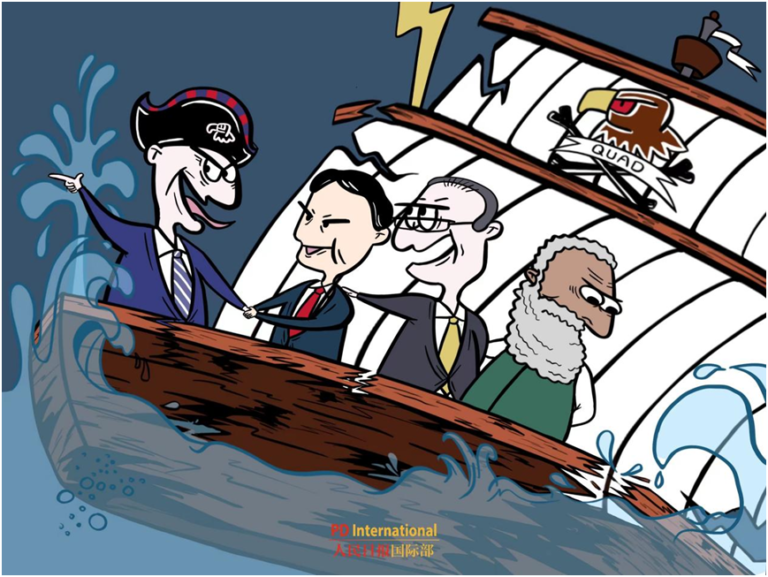
By Zhong Sheng, People’s Daily
U.S. President announced the so-called Indo-Pacific Economic Framework during his recent visit to Asia, in an attempt to pitch the Indo-Pacific Strategy and trying to form a clique that contains China.
What the U.S. did was obviously motivated by the Cold War mentality and intended to serve the “America first” and protect American hegemony. It makes the world divided, incites confrontation and breaks peace, and will exert destructive influence on regional peace, stability and development.
There has already been a functional regional cooperation framework in the Asia-Pacific region from which regional countries benefit. The U.S., starting another framework in the region that dilutes the concept of “Asia-Pacific,” is obviously not working for the development or prosperity of regional countries.
Every country in the region is aware of that. The Indo-Pacific strategy, once being announced, has put regional countries on guard for the Cold War features it carries.
Recently, the U.S. once again packaged the strategy, hoping to create an illusion of “high-standard cooperation” by setting up another so-called framework and a new set of rules in the region. However, when the strategy was firstly proposed, the U.S. put it clear that the strategy was formed to make sure that the U.S. wins the competition in the 21st century and presents regional countries an alternative to China’s approach.
This fully indicates that the framework serves American geostrategies, and the so-called “importance” the U.S. says it attaches to its allies and partners is just to decouple regional countries from the Chinese economy, making Asian-Pacific countries cat’s-paws for the hegemony of the U.S. This explains why the framework involves no tariff exemption or market access regulation and why it doesn’t care about the development and demands of regional countries.
Evan Feigenbaum, Vice President for Studies at the Carnegie Endowment for International Peace noted that the U.S. is running around Asia making every policy, relationship, and initiative derivative of American competition with China. There’s no affirmative vision for the region that doesn’t begin and end with competing with China, he said.
The Indo-Pacific framework is not a new trick for the U.S. to politicize, weaponize and ideologize economic problems.
The country has said repeatedly that it is not seeking a new Cold War with China or opposing China by strengthening relations with its allies, nor is it supporting the Taiwan independence. However, the recent practices of the U.S. are obviously against what the country has said.
When the U.S. was selling the so-called Indo-Pacific strategy, it declared that it would change the environment surrounding China, which has fully exposed its intention to contain China. Besides, the U.S. also played the Taiwan card, trying to bring chaos to the Asia-Pacific region after it disrupted other parts of the world. This is extremely dangerous.
China will never allow any country to interfere in its domestic affairs, hurt its interests or smear it. It will firmly safeguard its sovereignty, security and development interests. This will never change because of the cliques formed by the U.S. or the bluff of the country. Any vicious attempt to contain China’s development and rejuvenation or disrupt China’s mutually beneficial cooperation with other countries is doomed to fail.
People in Asia-Pacific countries still have a fresh memory of the conflicts led by hegemony. They cherish the hard-won peaceful environment.
It is a trend of the times for the region to promote regional integration and build an Asia-Pacific community with a shared future. Countries in the region are not willing to take sides, and they have a mainstream voice for getting along with each other for win-win cooperation. The attempts of a few countries to bring military alliances and bloc confrontation to the region will hurt the common interests of regional countries.
At the recent U.S.-ASEAN Special Summit, ASEAN countries jointly stressed that they wanted peace and cooperation, not divides or confrontation. They said they would not take sides.
China is committed to safeguarding the peace and stability, as well as lasting prosperity of the Asia-Pacific region. As the largest trading partner for most of the regional countries, it sees its interests deeply intertwined with those of the regional countries. The gigantic market with 1.4 billion people will keep opening up to regional countries, and China will definitely expand mutual benefits with regional countries. Countries that try to isolate China will only end up isolating themselves.
Win-win cooperation holds the key to the success of the Asia-Pacific region, not zero-sum confrontation. Only cooperation makes win-win results, while confrontation leads to only a dead end.
Both China and the U.S. are Asia-Pacific countries, they could have a similar “circle of friends.” The Asia-Pacific should become a high ground for peaceful development, not a battleground for geopolitics. Any country that attempts to create camp politics, build an Asia-Pacific version of NATO and wage a new Cold War in the Asia-Pacific region is placing itself on the opposite side of the regional countries that are committed to peace and development.
The U.S. should abandon the outdated Cold War mentality, start from the common and long-term interests of the Asia-Pacific region, follow the principles of mutual benefit and win-win cooperation, and play a constructive role in maintaining regional peace, stability and development. It should make concrete contributions to the regional cooperation of the Asia-Pacific with a healthy mindset.
(Zhong Sheng is a pen name often used by People’s Daily to express its views on foreign policy and international affairs.)










